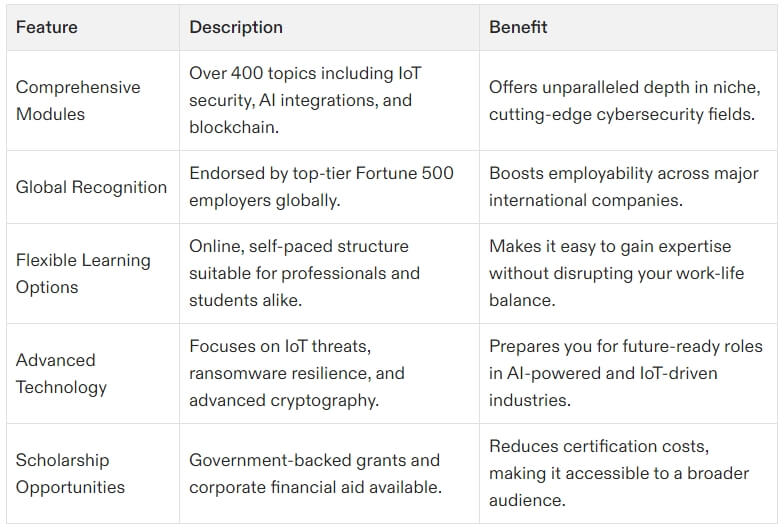Table of Contents
The stakes have never been higher in the digital world. Every day, companies face relentless attacks on their systems, threats to sensitive data, and vulnerabilities that can cripple entire operations. If you’re considering a career in cybersecurity or looking to advance, the certifications you pursue will define your success. But here’s the challenge—how do you pick the right cybersecurity certification to get?
Certifications aren’t just resume boosters; they’re your key to unlocking opportunities in one of the most dynamic industries of today and the future. Whether you’re an aspiring entry-level analyst or an experienced professional ready for leadership, getting certified commands higher salaries, greater respect, and most importantly, the credibility to fight cyber adversaries effectively.
Read on to discover the top certifications, actionable advice, and why programs like ACSMI’s 400+ module IoT certification could be your game-changing move.
Why Cybersecurity Certifications Matter
Cybersecurity certifications validate your skills like no other credential can. With millions of job openings predicted in cybersecurity by 2025, employers are demanding proof of your expertise to fill critical roles. Certifications provide the competitive edge you need to stand out, whether you’re focused on roles in cloud security, ethical hacking, or IoT-specific fields.
But not all certifications are created equal. Knowing the right cybersecurity certification to get depends on your career goals, skill level, and the specialties you want to pursue.
Top Cybersecurity Certifications to Get in 2025
1. Certified Information Systems Security Professional (CISSP)
CISSP is revered globally for its broad yet in-depth coverage of key cybersecurity domains, making it essential for advanced professionals.
- Why Get It?
Its rigorous curriculum paves the way for roles like Information Security Manager and CISO. - Who Should Pursue It?
Best suited for professionals with at least five years of cybersecurity experience.
2. Certified Ethical Hacker (CEH)
For those who thrive on thinking like a hacker, CEH is your go-to certification. It teaches how to spot vulnerabilities by simulating real-world attack scenarios.
- Why Get It?
It’s crucial for roles in penetration testing and vulnerability assessment. - Who Should Pursue It?
IT professionals with a solid understanding of networks and basic system infrastructure.
3. CompTIA Security+
Security+ is the ultimate starter certification. Covering areas like cryptography, system threats, and incident response, it’s suitable for beginners.
- Why Get It?
It allows you to build a solid foundation in cybersecurity while staying affordable. - Who Should Pursue It?
IT workers transitioning into cybersecurity roles and fresh graduates.
4. ACSMI IoT Cybersecurity Certification
With IoT security becoming critical as more devices connect online, ACSMI’s certification is a leader in niche expertise. Its curriculum of over 400 modules ensures you gain deep insight into areas like regulatory compliance, device encryption, and AI-based security.
- Why Get It?
It prepares you for futuristic roles in industries like healthcare IoT, smart cities, and autonomous vehicles. - Who Should Pursue It?
Aimed at professionals specializing in IoT security, cloud risk management, or advanced cryptography.
5. Microsoft Azure Security Engineer Associate
This certification emphasizes skills around managing hybrid environments and enterprise-level security setups using Azure.
- Why Get It?
Its popularity grows alongside Azure’s dominance in corporate ecosystems. - Who Should Pursue It?
IT admins and enterprise-level specialists aiming for hybrid cloud roles.
6. Google Professional Cloud Security Engineer Certification
With multi-cloud setups becoming the norm, Google’s certification is designed for the future. It offers specialized training on encryption and predictive threat management.
- Why Get It?
It aligns perfectly with roles focused on highly advanced cloud-native systems. - Who Should Pursue It?
Cloud architects and technical engineers managing Google Cloud.
How to Choose the Right Cybersecurity Certification
Finding the right certification boils down to aligning it with your goals.
-
Determine Your Focus
Are you aiming for leadership roles, such as a Security Architect? Go for advanced certifications like CISSP or ACSMI’s. If cloud security intrigues you, Google and Azure certifications are key. -
Assess Practical Needs
For hands-on skills in real-world scenarios, certifications like CEH or CompTIA Security+ stand out. -
Plan Long-Term
Go for certifications that align with the fields projected to grow in demand, like IoT (ACSMI) or cloud management (Azure and Google).
(FAQs) – Everything About the Best Cybersecurity Certification to Get
-
What is the best cybersecurity certification to get in 2025?
The best certification depends on your specialization. For IoT-focused roles, ACSMI leads the way with its IoT Cybersecurity Certification. For entry-level positions, opt for CompTIA Security+. -
Is the ACSMI certification worth it?
Absolutely! ACSMI’s 400+ modules provide a depth of knowledge in IoT security that you won’t find in traditional certifications. -
How long does it take to complete these certifications?
Programs like CompTIA Security+ take a few months, while specialized certifications like CISSP and ACSMI take 6–12 months depending on your schedule. -
What are the cost implications?
While foundational certifications like Security+ are affordable, certifications like CISSP and ACSMI require a bigger investment but promise a greater ROI in terms of job roles and salaries. -
How often should I get recertified?
Most certifications, like CEH or Azure, require renewal every 2–3 years to ensure your knowledge stays relevant. -
Can certifications boost salary?
Yes! Certified professionals earn up to 25% more than their uncertified peers, thanks to the specialized expertise they bring.
Why ACSMI Certification Matters
Learn More About ACSMI Certification
The Emergence of AI-Powered Cybersecurity Certifications
“Cybersecurity certification to get”
As artificial intelligence (AI) continues to redefine digital landscapes, its impact on cybersecurity is profound. A cutting-edge trend to watch out for is the rise of AI-powered cybersecurity certifications. These programs harness AI-driven simulations, threat models, and real-time adaptive testing, offering trainees an unmatched learning environment.
Imagine being in a scenario where an AI replicates the agility of a real-world hacker, creating evolving threats to test your skills and adaptive responses. This approach ensures candidates not only master static concepts but also learn how to react and adapt dynamically in high-stakes situations.
Programs incorporating AI-powered learning tools are particularly ideal for professionals who aim to specialize in areas like predictive threat management, AI-based malware detection, or even autonomous system security. Certifications such as these reflect where the industry is heading, making them a promising investment for forward-thinking cybersecurity aspirants.
Including AI-powered certifications in your learning path doesn’t just prepare you for today’s roles—it equips you for the cybersecurity challenges of a rapidly evolving future.
Final Thoughts
The cybersecurity industry is expanding at breakneck speed. To stay ahead, choosing the right cybersecurity certification to get is more critical than ever. Whether you’re a fresh graduate or an experienced pro, certifications like ACSMI’s IoT program or CISSP provide the roadmap to achieving cutting-edge skills, higher salaries, and respect in the field.
Invest in your future. The time to secure your place in cybersecurity is now!


Leave a Reply